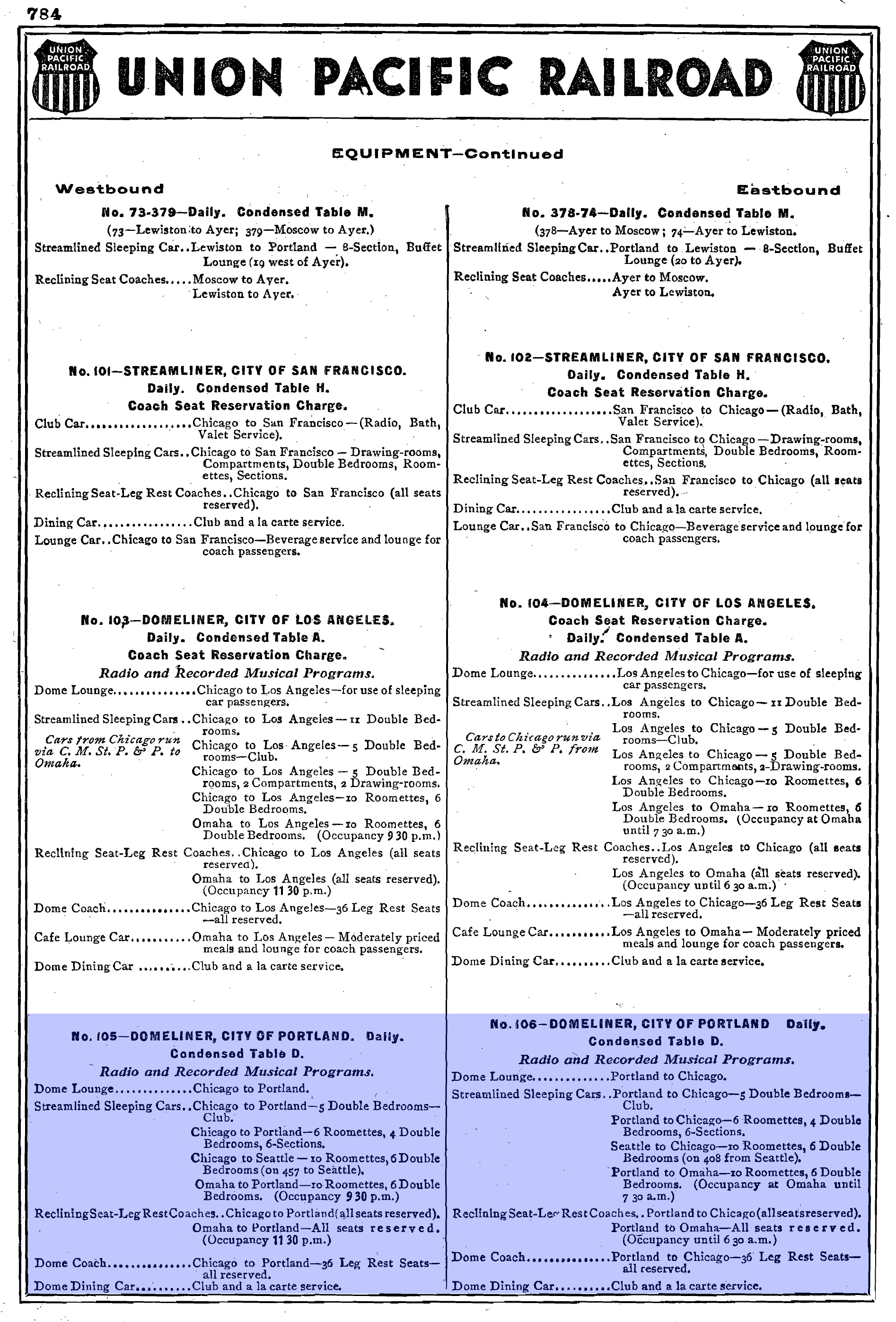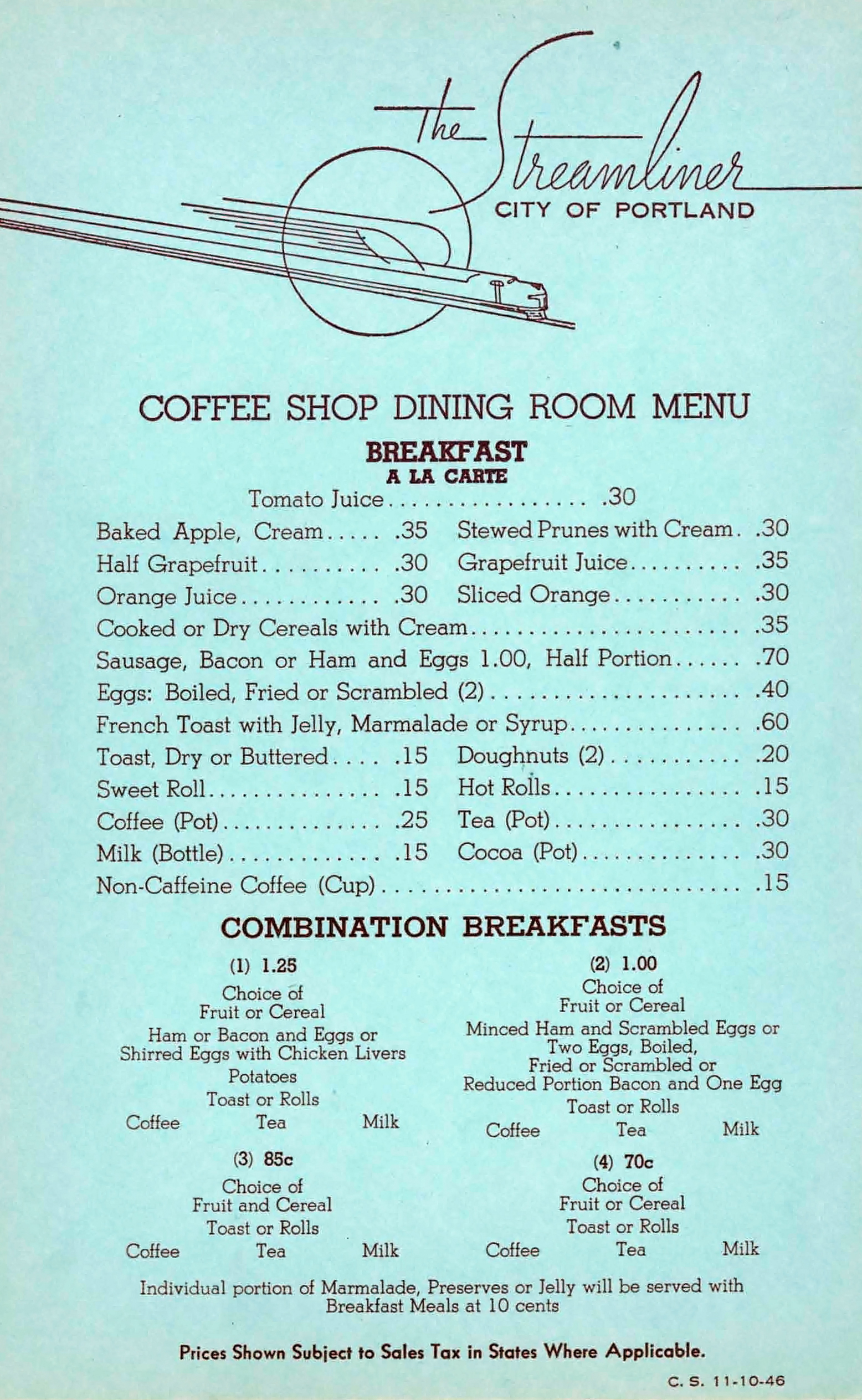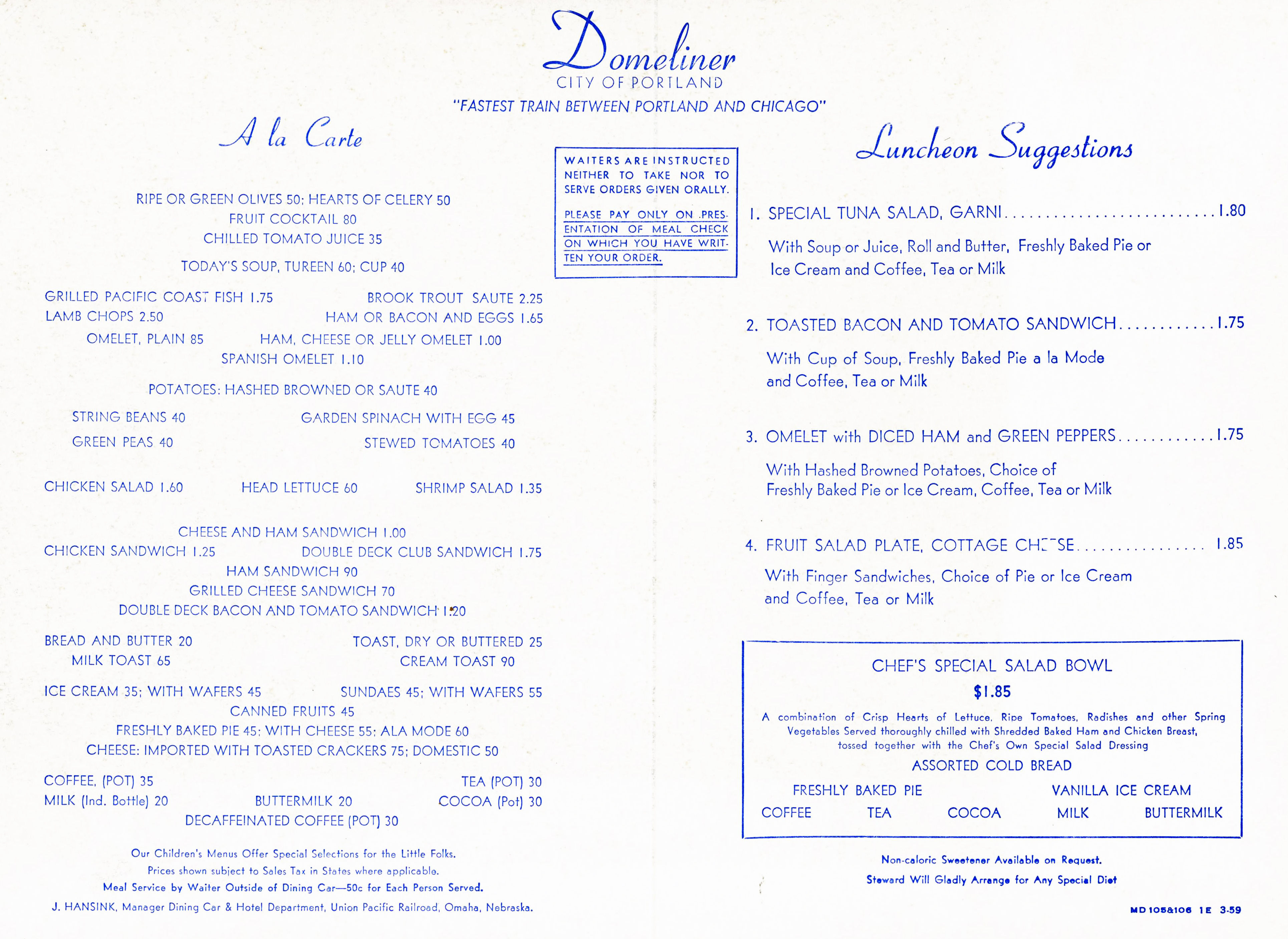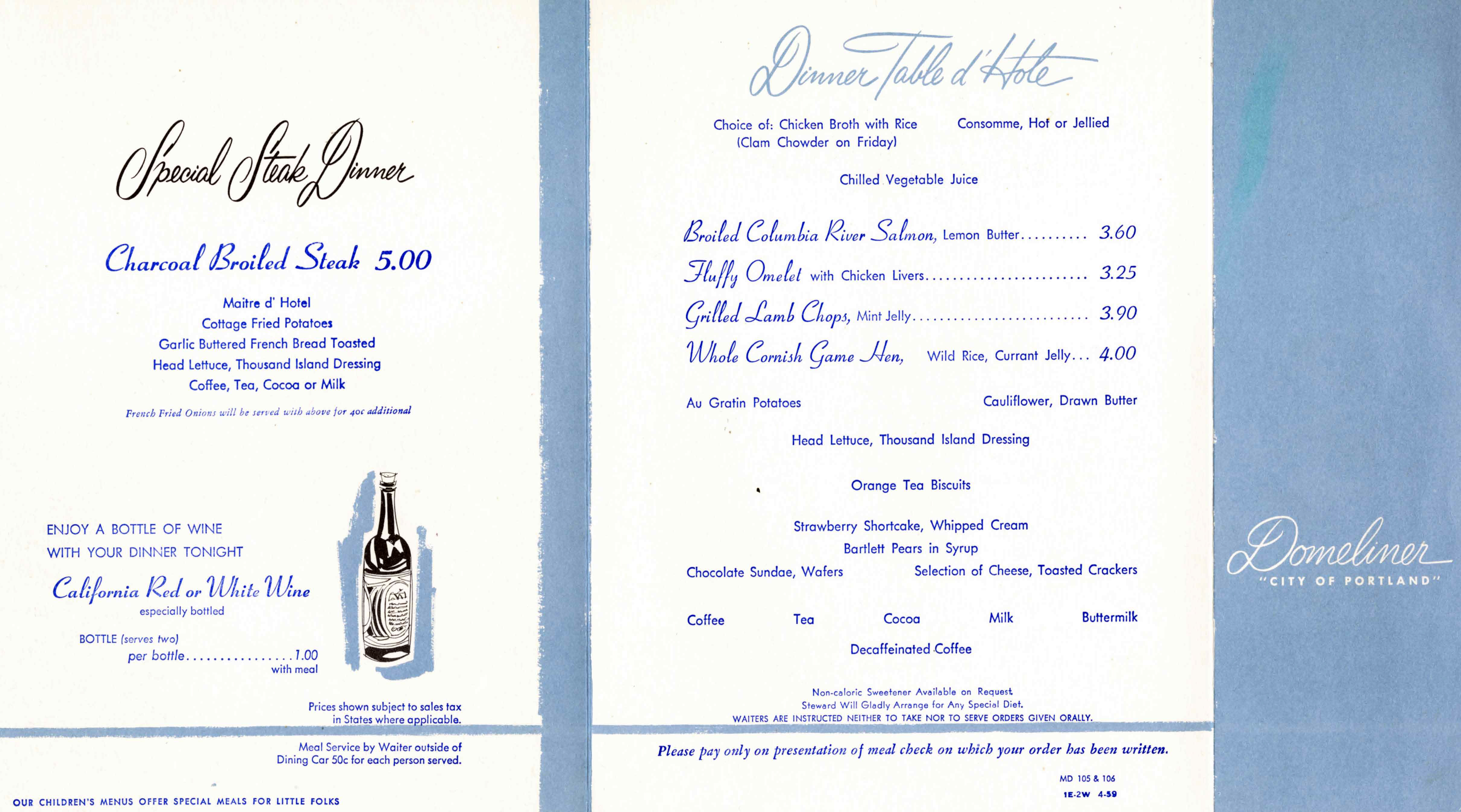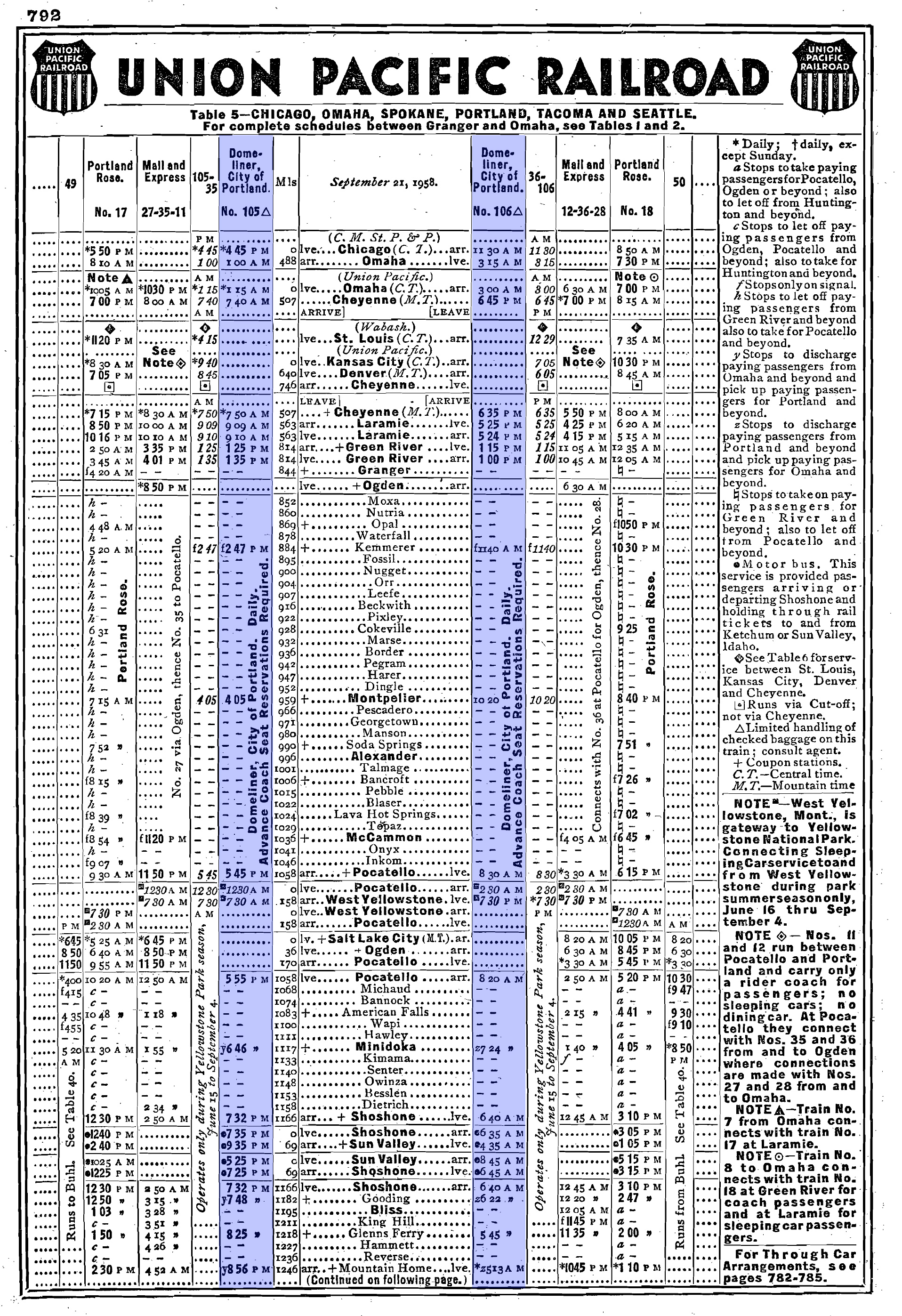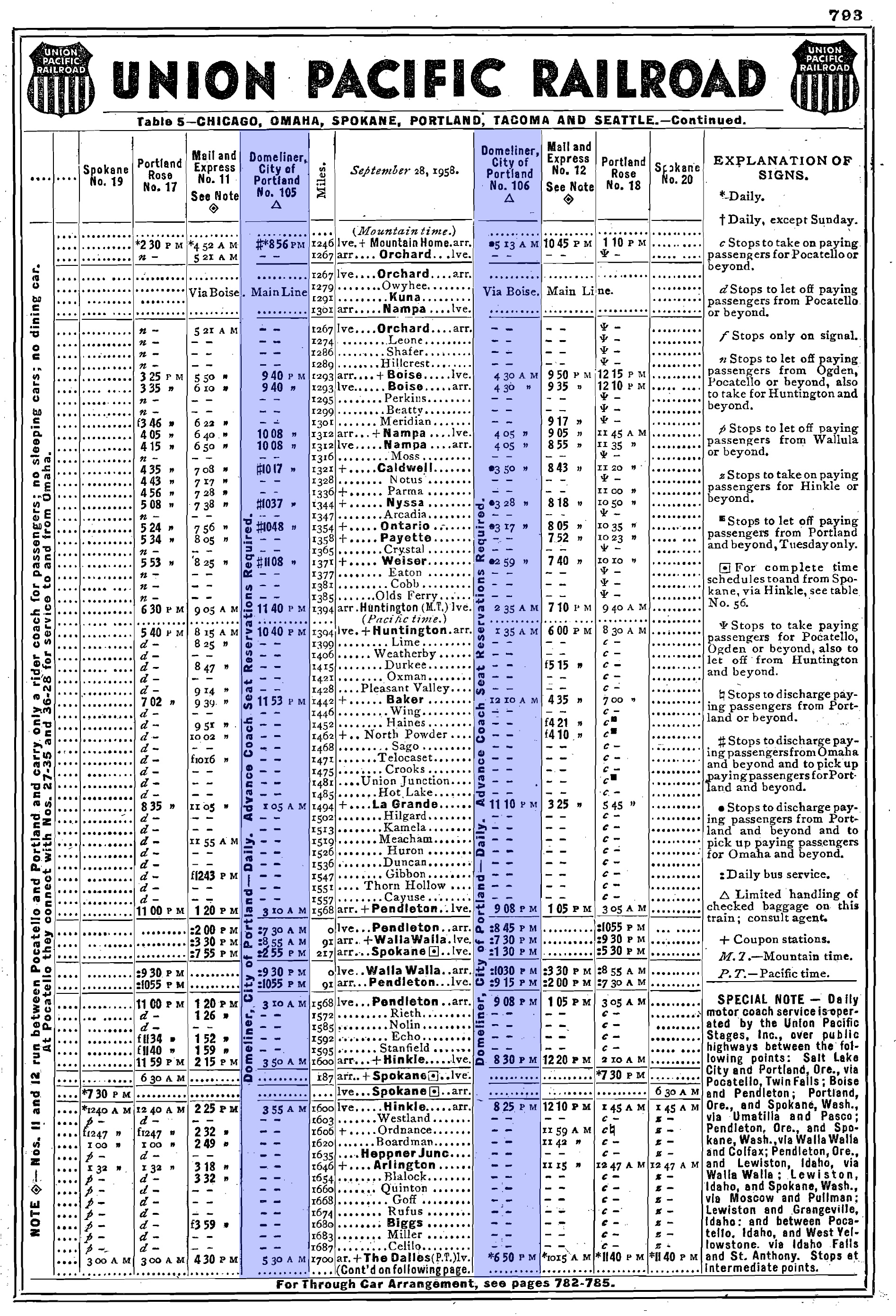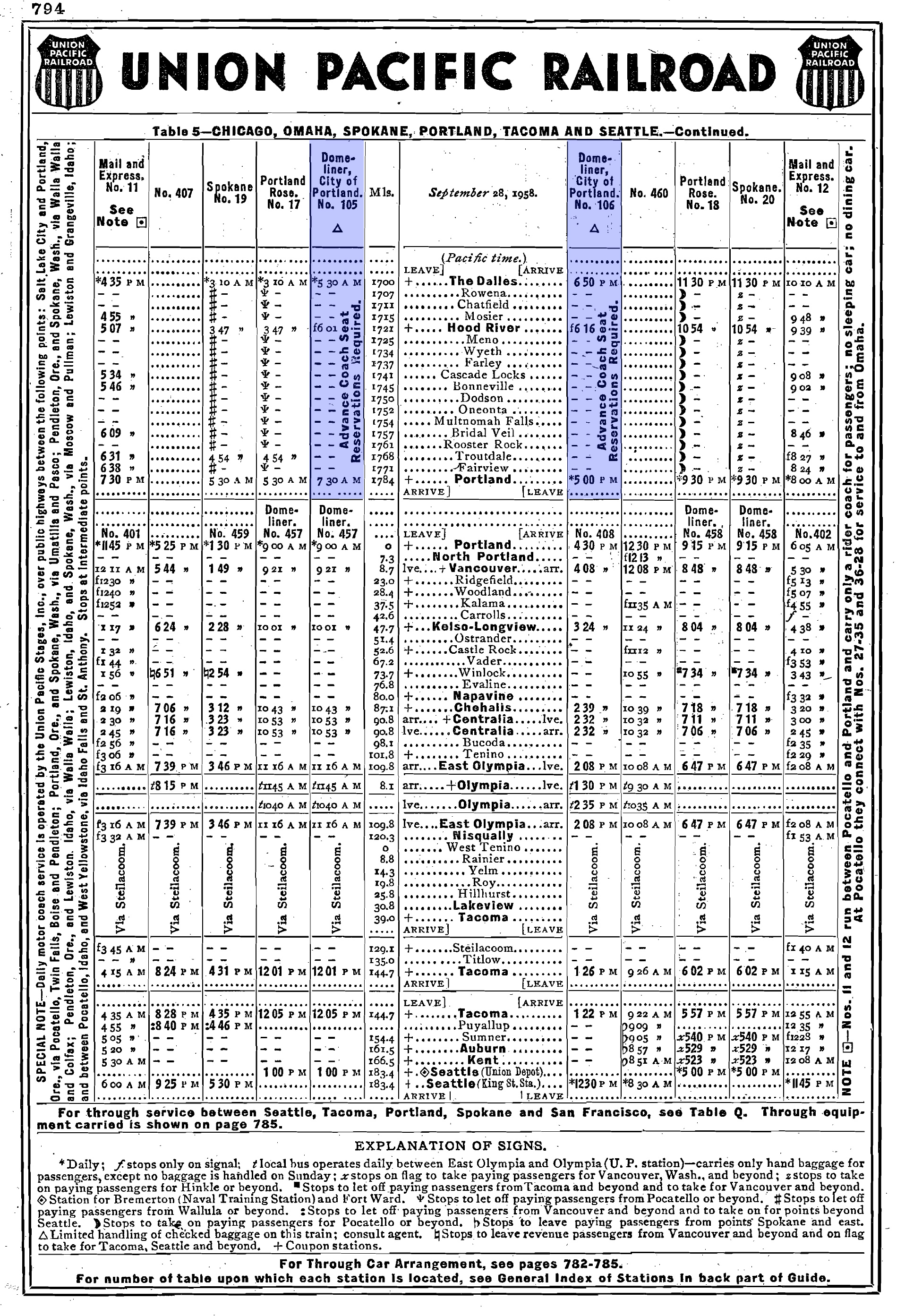UP's "City of Portland" (Train): Consist, Route, Schedule
Last revised: February 24, 2025
By: Adam Burns
The City of Portland was one of the Union Pacific's very first streamliners in its City fleet. The railroad hosted an entire array of other plush City trains including the City of Angeles, City of Denver, City of Salina (the original M-10000), City of St. Louis, City of San Francisco).
The Portland became a highly successful streamliner following its debut as an semi-articulated trainset and convinced the UP that offering numerous on board amenities along with a sleek-looking train was the future of passenger rail travel.
History
Today, the City fleet can still be witnessed, in a manner of speaking, as the UP’s official business train is not only decorated in the Cities’ classic livery but also includes the original equipment from them, right down to the two E9A and E9B diesel locomotives that power it!
Union Pacific, the largest and most powerful railroad in the country, has been with us since 1862. Its creation is thanks to President Abraham Lincoln and Congress's efforts to build a transcontinental railroad.
The company is far older than any other American Class I railroad today with the Kansas City Southern in a nearby second.
Photos
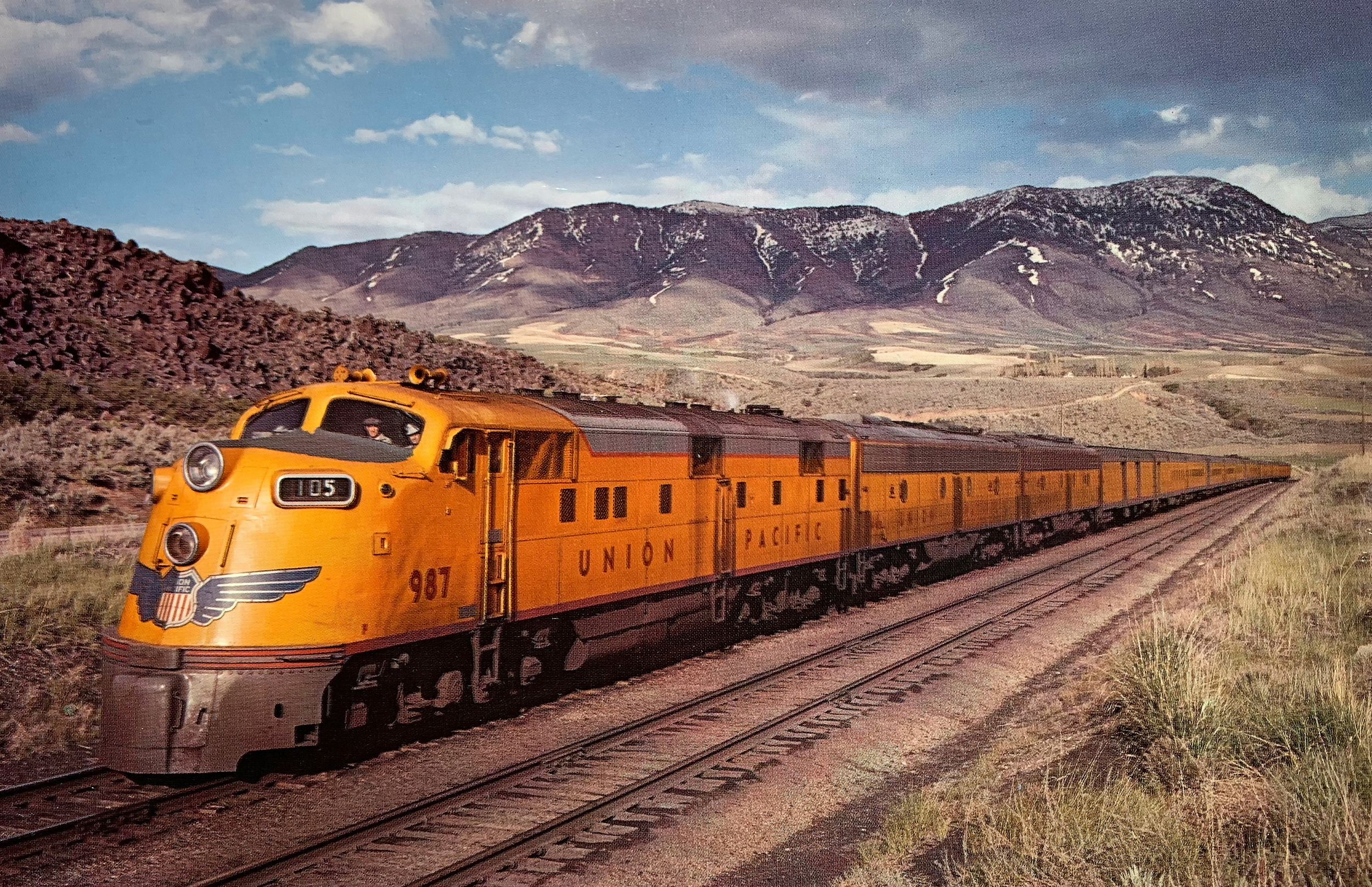 A Union Pacific publicity photo featuring train #105, the westbound "City of Portland," posed along the main line between McCammon and Pocatello, Idaho during the summer of 1953. American-Rails.com collection.
A Union Pacific publicity photo featuring train #105, the westbound "City of Portland," posed along the main line between McCammon and Pocatello, Idaho during the summer of 1953. American-Rails.com collection.In that time UP has become not only one of the most highly respected institutions in the nation but also has seen nearly every major railroading event in our country’s history, and accordingly has a very long and storied history.
Initially launched on May 5, 1935, the City of Portland was Union Pacific’s gateway to the Pacific Northwest, although, because it operated a more southerly routing than famed Northwestern passenger trains like the Great Northern’s Empire Builder or Northern Pacific’s North Coast Limited the train is sometimes forgotten about or overlooked.
Like the City of Los Angeles, for the first twenty years or so of the train’s existence it was operated in conjunction with the Chicago & North Western Railway which ferried the Portland from Omaha, eastward to Chicago.
At A Glance
40 Hours, 45 Minutes (Westbound) 40 Hours, 30 Minutes (Eastbound) |
|
105 (Westbound) 106 (Eastbound) | |
Union Station (Chicago) Union Station (Portland) |
This setup lasted until 1955 when the UP, dissatisfied with the services C&NW was providing handed the train over to rival Milwaukee Road, a partnership that would last until the train’s end.
While the Empire Builder and North Coast Limited may go down in history as the most famous Northwestern passenger trains, the Portland carries several historical distinctions:
- Firstly, the train was the very first streamlined transcontinental passenger train to operate when it took to the rails in the spring of 1935, known on the UP as the M-10001 it was a semi-articulated trainset with a five-car consist.
- Secondly, the Portland was the first to offer dining and sleeping services. The train was also the first to feature the now-classic round-end observation.
Along with the City of Los Angeles, the Portland was Union Pacific’s premier passenger operation and the railroad spared no expense on the train.
While the City of Portland's routing offered a bit less scenery over the prairies and foothills of the famed Overland Route between Omaha, Nebraska and Granger, Wyoming the train featured accommodations as fine as anything one could find nationwide.
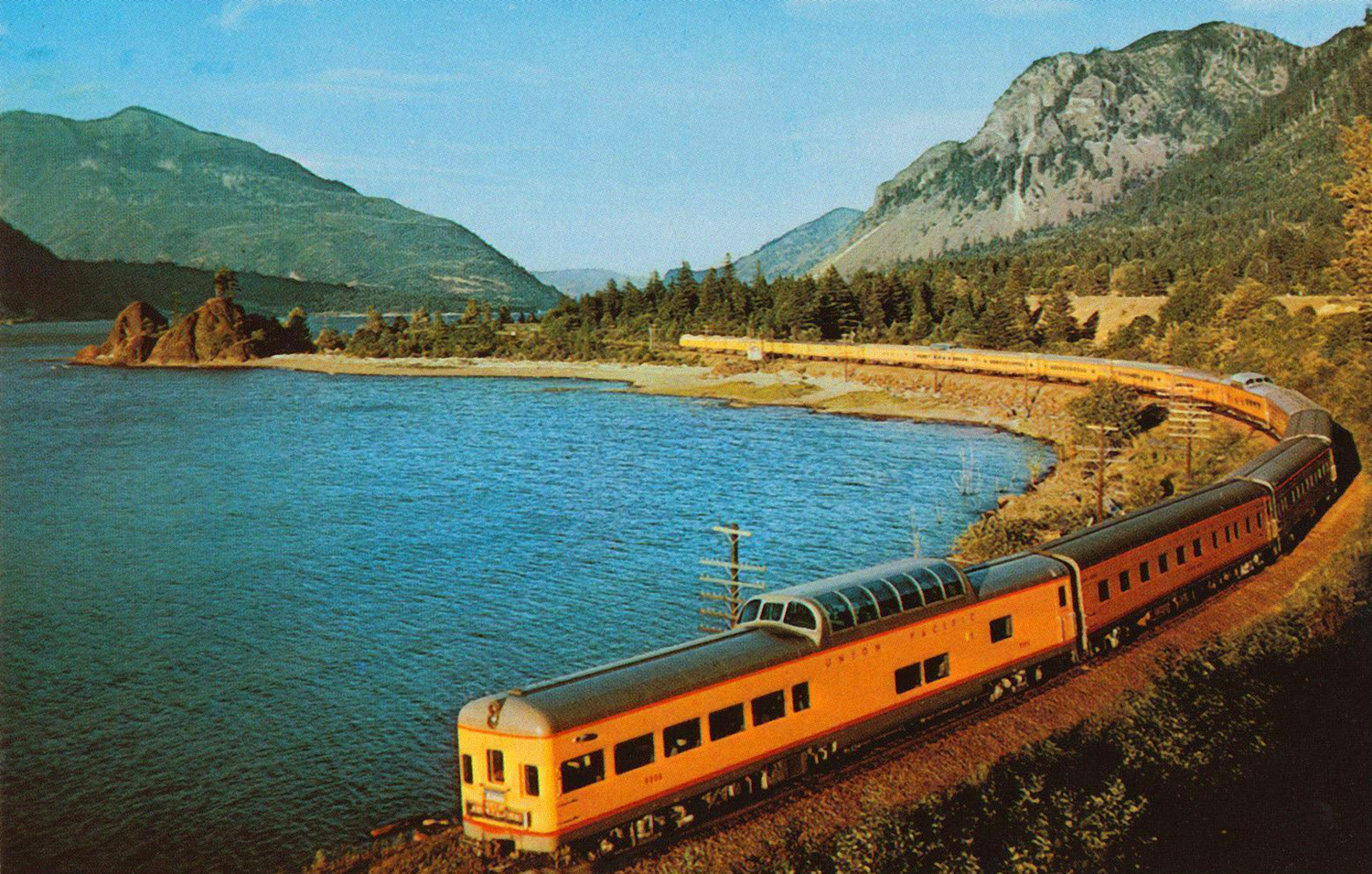 The famous publicity photo of the "City of Portland" features the train skirting the Columbia River Gorge east of Portland. The scene dates to no earlier than 1954-1955 when Union Pacific acquired its 35 lightweight, streamlined cars from American Car & Foundry. Bringing up the train's tail end is Astra-Dome, blunt-end observation lounge #9006. There were five built for the train.
The famous publicity photo of the "City of Portland" features the train skirting the Columbia River Gorge east of Portland. The scene dates to no earlier than 1954-1955 when Union Pacific acquired its 35 lightweight, streamlined cars from American Car & Foundry. Bringing up the train's tail end is Astra-Dome, blunt-end observation lounge #9006. There were five built for the train.With the railroad receiving upgraded equipment from both Pullman-Standard, American Car & Foundry, and EMD following World War II, the Portland the train was completely reequipped with new lightweight, streamlined equipment and in the 1950s received Domeliners.
Timetable (June, 1956)
| Read Down Time/Leave (Train #105/Milwaukee Road) | Milepost | Location | Read Up Time/Arrive (Train #106/Milwaukee Road) |
|---|---|---|---|
| 4:45 PM (Dp) | 0.0 | 11:30 AM (Ar) | |
| 5:25 PM | 37 | 10:35 AM | |
| 80 | 9:57 AM | ||
| 6:56 PM (Ar) | 138 | 9:02 AM (Dp) | |
| 7:03 PM (Dp) | 138 | 8:55 AM (Ar) | |
| 8:31 PM | 227 | 7:34 AM | |
| 10:35 AM (Ar) | 362 | 5:26 AM (Dp) | |
| 10:40 AM (Dp) | 362 | 5:21 AM (Ar) | |
| 423 | 4:27 AM | ||
| 1:00 AM (Ar) | 487 | 3:15 AM (Dp) | |
| Time/Leave (Train #105/Union Pacific) | Milepost | Location | Time/Arrive (Train #106/Union Pacific) |
| 1:10 AM (Dp) | 487 | 3:05 AM (Ar) | |
| F | 525 | F | |
| F | 570 | F | |
| 3:14 AM (Ar) | 632 | 12:55 AM (Dp) | |
| 3:15 AM (Dp) | 632 | 12:54 AM (Ar) | |
| F | 674 | F | |
| 5:05 AM (Ar) | 769 | 11:03 PM (Dp) | |
| 4:10 AM (Dp) | 769 | 9:58 PM (Ar) | |
| 5:52 AM (Ar) | 893 | 8:17 PM (Dp) | |
| 5:53 AM (Dp) | 893 | 8:16 PM (Ar) | |
| 7:35 AM (Ar) | 995 | 6:55 PM (Dp) | |
| 7:45 AM (Dp) | 995 | 6:54 PM (Ar) | |
| 9:09 AM (Ar) | 1051 | 5:25 PM (Dp) | |
| 9:10 AM (Dp) | 1051 | 5:24 PM (Ar) | |
| 11:04 AM (Ar) | 1168 | 3:35 PM (Dp) | |
| 11:05 AM (Dp) | 1168 | 3:34 PM (Ar) | |
| F 12:55 PM | 1287 | F 1:35 PM | |
| 1:25 PM (Ar) | 1302 | 1:15 PM (Dp) | |
| 1:35 PM (Dp) | 1302 | 1:00 PM (Ar) | |
| F 2:47 PM | 1372 | F 11:40 AM | |
| 4:05 PM | 1447 | 10:20 AM | |
| 5:45 PM (Ar) | 1546 | 8:30 AM (Dp) | |
| 5:55 PM (Dp) | 1546 | 8:20 AM (Ar) | |
| 6:46 PM | 1605 | 7:24 AM | |
| 7:32 PM | 1654 | 6:40 AM | |
| 7:48 PM | 1670 | 6:22 AM | |
| 8:25 PM | 1706 | 5:45 AM | |
| 8:56 PM | 1734 | 5:13 AM | |
| 9:40 PM | 1781 | 4:30 AM | |
| 10:08 PM | 1800 | 4:06 AM | |
| 10:17 PM | 1809 | 3:50 AM | |
| 10:37 PM | 1832 | 3:29 AM | |
| 10:48 PM | 1842 | 3:17 AM | |
| 11:08 PM | 1859 | 2:59 AM | |
| 11:40 PM (Ar) | 1882 | 2:35 AM (Dp) | |
| 10:40 PM (Dp) | 1882 | 1:35 AM (Ar) | |
| 11:53 PM | 1930 | 12:10 AM | |
| 1:05 AM | 1982 | 11:10 PM | |
| 3:10 AM | 2056 | 9:08 PM | |
| 3:50 AM (Ar) | 2088 | 8:30 PM (Dp) | |
| 3:55 AM (Dp) | 2088 | 8:25 PM (Ar) | |
| 5:30 AM | 2188 | 6:50 PM | |
| F 6:01 AM | 2209 | F 6:18 PM | |
| 7:30 AM (Ar) | 2272 | 5:00 PM (Dp) |
The new equipment, as the original streamliners that had debuted in the mid-1930s, was also adorned in a striking livery of Armour yellow and light gray with red trim, a paint scheme still in use today on the Union Pacific.
Consist (1952)
Consist (1958)
Overall, on a typical Portland
train one could expect to find four Pullman sleepers, café-lounge, dome
lounge-observation, dome coach, and a dome diner (in total the train's
consist included about 13 cars).
For power the train featured E7s on the point, and later used both E8s and E9s (the last two E series models EMD ever produced).
Interestingly, despite the City of Los Angeles and City of San Francisco normally receiving the most attention by historians, UP always considered the City of L.A. and City of Portland its two, premier streamliners, providing them with the newest and best equipment as it became available.
Menus
Breakfast (1946)
Lunch (1959)
Dinner (1959)
To provide passengers with the best viewing experience aboard the Portland the Union Pacific scheduled the train to run through darkness, as much as possible, east of Cheyenne, Wyoming so that patrons could enjoy the breathtaking views of the mountain ranges through western Wyoming, Idaho, and Oregon.
Timetable (1958)
Listed as Trains #105 (westbound) and #106 (eastbound) on Union Pacific's official timetable, the Portland would leave Chicago Union Station around 5 pm in the evening and be handed off to the UP at Omaha around 1 am early the following morning.
From there patrons could wake up to breakfast at Cheyenne and see the gorgeous mountain views for the rest of the day, having dinner that evening in south-central Idaho as the continued westward.
 Union Pacific's combined "City of Denver"/"City of Portland" is eastbound at Gilcrest, Colorado circa 1961.
Union Pacific's combined "City of Denver"/"City of Portland" is eastbound at Gilcrest, Colorado circa 1961.Final Years
Heading to bed that night passengers could then wake up early the next morning ready to de-board at Portland although the train did offer through sleeper service to Seattle.
Overall the trip would normally take just under 41 hours with UP able to carry an average train speed of nearly 56 mph (quite fast for the rugged country in which the railroad operated!).
Through the end the City of Portland, along with her sister City trains, remained a top-notch, all matching consist operation by Union Pacific although by the 1960s the railroad had combined most of its City fleet east of Wyoming.
While service remained at a high level this, however, did not secure the Portland or other City trains’ futures as they were all discontinued with the startup of Amtrak in the spring of 1971. Today, the trains live on in memory only and UP's official business train.
Recent Articles
-
Building A T1 Again: The PRR 5550 Project
Feb 15, 26 06:10 PM
Today, a nonprofit group, the PRR T1 Steam Locomotive Trust, is doing something that would have sounded impossible for decades: building a brand-new T1 from the ground up. -
PRR T1 No. 5550’s Cylinders Nearing Completion
Feb 15, 26 12:53 PM
According to a project update circulated late last year, fabrication work on 5550’s cylinders has advanced to the point where they are now “nearing completion,” with the Trust reporting cylinder work… -
Santa Fe 3415's Rebuild Nears Completion
Feb 15, 26 12:14 PM
One of the Midwest’s most recognizable operating steam locomotives is edging closer to the day it can lead excursions again. -
Ohio Pizza Train Rides
Feb 15, 26 10:59 AM
Among Lebanon Mason & Monroe Railroad's easiest “yes” experiences for families is the Family Pizza Train—a relaxed, 90-minute ride where dinner is served right at your seat, with the countryside slidi… -
Wisconsin Pizza Train Rides
Feb 15, 26 10:57 AM
Among Wisconsin Great Northern's lineup, one trip stands out as a simple, crowd-pleasing “starter” ride for kids and first-timers: the Family Pizza Train—two hours of Northwoods views, a stop on a tal… -
Illinois "Pizza" Train Rides
Feb 15, 26 10:55 AM
For both residents and visitors looking to indulge in pizza while enjoying the state's picturesque landscapes, the concept of pizza train rides offers a uniquely delightful experience. -
Tennessee's ~ Murder Mystery ~ Dinner Train Rides
Feb 15, 26 10:50 AM
Amidst the rolling hills and scenic landscapes of Tennessee, an exhilarating and interactive experience awaits those with a taste for mystery and intrigue. -
California's ~ Murder Mystery ~ Dinner Train Rides
Feb 15, 26 10:48 AM
When it comes to experiencing the allure of crime-solving sprinkled with delicious dining, California's murder mystery dinner train rides have carved a niche for themselves among both locals and touri… -
Virginia's Dinner Train Rides In Staunton!
Feb 15, 26 10:46 AM
If you’ve ever wished you could pair a classic scenic train ride with a genuinely satisfying meal—served at your table while the countryside rolls by—the Virginia Scenic Railway was built for you. -
New Hampshire's Dinner Train Rides In N. Conway
Feb 15, 26 10:45 AM
Tucked into the heart of New Hampshire’s Mount Washington Valley, the Conway Scenic Railroad is one of New England’s most beloved heritage railways. -
Union Pacific 4014 Begins Coast-To-Coast Tour
Feb 15, 26 12:30 AM
Union Pacific’s legendary 4-8-8-4 “Big Boy” No. 4014 is scheduled to return to the main line in a big way this spring, kicking off the railroad’s first-ever coast-to-coast steam tour as part of a broa… -
Amtrak Introduces The Cascades Airo Trainset
Feb 15, 26 12:11 AM
Amtrak pulled the curtain back this month on the first trainset in its forthcoming Airo fleet, using Union Station as a stage to preview what the railroad says is a major step forward in comfort, acce… -
Nevada Northern Railway 2-8-0 81 Returns
Feb 14, 26 11:54 PM
The Nevada Northern Railway Museum has successfully fired its Baldwin-built 2-8-0 No. 81 after a lengthy outage and intensive mechanical work, a major milestone that sets the stage for the locomotive… -
Metrolink F59PH 851 Preserved In Fullerton, CA
Feb 14, 26 11:41 PM
Metrolink has donated locomotive No. 851—its first rostered unit—to the Fullerton Train Museum, where it will be displayed and interpreted as a cornerstone artifact from the region’s modern passenger… -
Oregon's Dinner Train Rides Near Mt. Hood!
Feb 14, 26 09:16 AM
The Mt. Hood Railroad is the moving part of that postcard—a century-old short line that began as a working railroad. -
Maryland's Dinner Train Rides At WMSR!
Feb 14, 26 09:15 AM
The Western Maryland Scenic Railroad (WMSR) has become one of the Mid-Atlantic’s signature heritage operations—equal parts mountain railroad, living museum, and “special-occasion” night out. -
Colorado Wild West Train Rides
Feb 14, 26 09:13 AM
If there’s one weekend (or two) at the Colorado Railroad Museum that captures that “living history” spirit better than almost anything else, it’s Wild West Days. -
South Dakota Beer Tasting Train Rides
Feb 14, 26 09:11 AM
While the 1880 Train's regular runs are a treat in any season, the Oktoberfest Express adds an extra layer of fun: German-inspired food, seasonal beer, and live polka set against the sound and spectac… -
Kentucky Wild West Train Rides
Feb 14, 26 09:10 AM
One of KRM’s most crowd-pleasing themed events is “The Outlaw Express,” a Wild West train robbery ride built around family-friendly entertainment and a good cause. -
Pennsylvania "Wild West" Train Rides
Feb 14, 26 09:08 AM
The Keystone State is home to a variety of historical attractions, but few experiences can rival the excitement and nostalgia of a Wild West train ride. -
Indiana "Wild West" Train Rides
Feb 14, 26 09:06 AM
Indiana offers a unique opportunity to experience the thrill of the Wild West through its captivating train rides. -
B&O Observation "Washington" Cosmetically Restored
Feb 14, 26 12:25 AM
Visitors to the B&O Railroad Museum will soon be able to step into a freshly revived slice of postwar rail luxury: Baltimore & Ohio No. 3316, the observation-tavern car Washington. -
Southern 2-8-2 4501 Returns To Classic Green
Feb 14, 26 12:24 AM
Tennessee Valley Railroad Museum officials announced that Southern Railway steam locomotive No. 4501—the museum’s flagship 2-8-2 Mikado—will reappear from its annual inspection wearing the classic Sou… -
Illinois Murder Mystery Dinner Train Rides
Feb 13, 26 12:04 PM
Among Illinois's scenic train rides, one of the most unique and captivating experiences is the murder mystery excursion. -
Vermont ~ Murder Mystery ~ Dinner Train Rides
Feb 13, 26 12:00 PM
There are currently murder mystery dinner trains offered in Vermont but until recently the Champlain Valley Dinner Train offered such a trip! -
Missouri Ice Cream Tasting Train Rides
Feb 13, 26 11:47 AM
Among the Iron Mountain Railway's warm-weather offerings, the Ice Cream Express stands out as a perfect “easy yes” outing: a short road trip, a real train ride, and a built-in treat that turns the who… -
Florida "Wild West" Train Rides
Feb 13, 26 09:53 AM
This article delves into wild west rides throughout Florida, the historical context surrounding them, and their undeniable charm. -
West Virginia "Wild West" Train Rides
Feb 13, 26 09:49 AM
While D&GV is known for several different excursions across the region, one of the most entertaining rides on its calendar is the Greenbrier Express Wild West Special. -
Alabama "Wild West" Train Rides
Feb 13, 26 09:47 AM
Although Alabama isn't the traditional setting for Wild West tales, the state provides its own flavor of historic rail adventures that draw enthusiasts year-round. -
Michigan "Wild West" Train Rides
Feb 13, 26 09:46 AM
While the term "wild west" often conjures up images of dusty plains and expansive deserts, Michigan offers its own unique take on this thrilling period of history. -
Grand Trunk Western 4-6-2 No. 5629
Feb 13, 26 12:10 AM
Included here is a detailed look at 5629’s build date and design, key specifications, revenue career on the Grand Trunk Western, its surprisingly active excursion life under private ownership, and its… -
New York Easter Train Rides
Feb 12, 26 01:19 PM
New York is home to several Easter-themed train rides including the Adirondack Railroad, Catskill Mountain Railroad, and a few others! -
Missouri Easter Train Rides
Feb 12, 26 01:13 PM
The beautiful state of Missouri is home to a handful of heritage railroads although only one provides an Easter-themed train ride. Learn more about this event here. -
Arizona's Wild West Train Rides
Feb 12, 26 01:05 PM
Let's delve into the captivating world of Arizona's Wild West train adventures, currently offered at the popular Grand Canyon Railway. -
Missouri's Wild West Train Rides
Feb 12, 26 12:49 PM
In Missouri, a state rich in history and natural beauty, you can experience the thrill of a bygone era through the scenic and immersive Wild West train rides. -
Maine's Tea Tasting Train Rides
Feb 12, 26 12:42 PM
Tea trains aboard the historic WW&F Railway Museum promises to transport you not just through the picturesque landscapes of Maine, but also back to a simpler time. -
Pennsylvania Tea Tasting Train Rides
Feb 12, 26 12:09 PM
In this article, we explore some of the most enchanting tea train rides in Pennsylvania, currently offered at the historic Strasburg Rail Road. -
Nevada St. Patrick's Day Train Rides
Feb 12, 26 11:39 AM
Today, restored segments of the “Queen of the Short Lines” host scenic excursions and special events that blend living history with pure entertainment—none more delightfully suspenseful than the Emera… -
Minnesota Ice Cream Tasting Train Rides
Feb 12, 26 10:22 AM
Among MTM’s most family-friendly excursions is a summertime classic: the Dresser Ice Cream Train (often listed as the Osceola/Dresser Ice Cream Train). -
Wisconsin's Wild West Train Rides
Feb 11, 26 10:54 PM
Through a unique blend of interactive entertainment and historical reverence, Wisconsin offers a captivating glimpse into the past with its Wild West train rides. -
Georgia's Wild West Train Rides
Feb 11, 26 10:44 PM
Nestled within its lush hills and historic towns, the Peach State offers unforgettable train rides that channel the spirit of the Wild West. -
North Carolina's Wild West Train Rides
Feb 11, 26 02:36 PM
North Carolina, a state known for its diverse landscapes ranging from serene beaches to majestic mountains, offers a unique blend of history and adventure through its Wild West train rides. -
South Carolina's Dinner Train Rides
Feb 11, 26 02:16 PM
There is only location in the Palmetto State offering a true dinner train experience can be found at the South Carolina Railroad Museum. Learn more here. -
Rhode Island's Dinner Train Rides
Feb 11, 26 02:08 PM
Despite its small size, Rhode Island is home to one popular dinner train experience where guests can enjoy the breathtaking views of Aquidneck Island. -
New York Tea Tasting Train Rides
Feb 11, 26 01:56 PM
Tea train rides provide not only a picturesque journey through some of New York's most scenic landscapes but also present travelers with a delightful opportunity to indulge in an assortment of teas. -
California Tea Tasting Train Rides
Feb 11, 26 01:37 PM
In California you can enjoy a quiet tea train experience aboard the Napa Valley Wine Train, which offers an afternoon tea service. -
Tennessee Tea Tasting Train Rides
Feb 11, 26 01:19 PM
If you’re looking for a Chattanooga outing that feels equal parts special occasion and time-travel, the Tennessee Valley Railroad Museum (TVRM) has a surprisingly elegant answer: The Homefront Tea Roo… -
Maine Ice Cream Tasting Train Rides
Feb 11, 26 11:58 AM
The Maine Narrow Gauge Railroad & Museum’s Ice Cream Train is a family-friendly Friday-night tradition that turns a short rail excursion into a small event. -
North Carolina Ice Cream Tasting Train Rides
Feb 11, 26 11:06 AM
One of the most popular warm-weather offerings at NCTM is the Ice Cream Train, a simple but brilliant concept: pair a relaxing ride with a classic summer treat. -
Pennsylvania "Wild West" Train Rides
Feb 10, 26 12:04 PM
The Keystone State is home to a variety of historical attractions, but few experiences can rival the excitement and nostalgia of a Wild West train ride.


